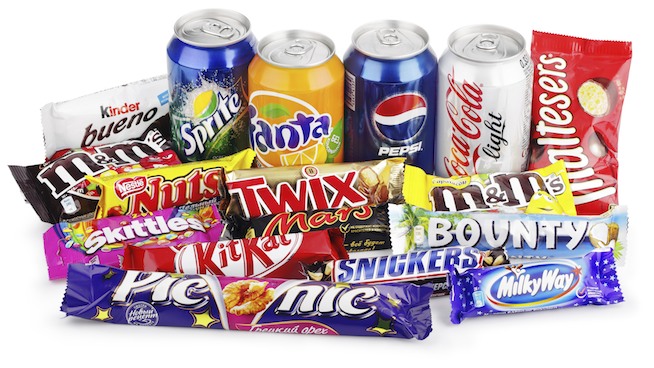How Poor Nutrition Habits Wreck Your Strength Gains
Ever wonder why you’re not making gains?
Usually the first change will be sets, reps, exercises or intensity of a workout. But should it instead be your nutrition plan?
If you’re disregarding what you put into your body, the chances of achieving muscle growth are slim to none. But by fueling your body properly with the right foods at the right times, you can crush plateaus and throw plates around like you’ve never done before.
Here’s how your nutrition plan can positively affect muscle growth.
You Don’t Eat Enough Protein

When you crush it in the gym, muscle growth and hormone production depend on the amount and (more importantly) the type of calories you put into your body.
RELATED: 20 Delicious Ways to Add Protein to Your Diet
Protein is the most essential macronutrient for muscle development. It is the main fuel supply for muscles, and it is made up of tons of amino acids, the building blocks of the body. Throughout the day, muscle protein breakdown generally exceeds protein synthesis, but athletes and meatheads alike want exactly the opposite. To build athletic, jacked muscles, you need to stimulate protein synthesis to combat natural muscle protein breakdown.
The best way to do this is to consume essential amino acids after exercise, increase insulin levels post-workout with smart carbohydrates, and frequently consume amino acids during waking hours. This should add up to about 12-15 percent of protein or 1 g/kg of body weight.
You Restrict Calories

As you transition from bulking season to beach season, your thought process goes from eating everything in sight to having pre-portioned, healthy meals at specific times of the day. Athletes generally think in this fashion too: strict nutritional planning midseason and more lax during the offseason.
If you’re really trying to “tone up” with calorie restriction, you could actually be stealing your own gains. You need around 2,800 calories to build one pound of muscle. Younger athletes and newbies in the gym can build some muscle in starvation mode, but if you’re a seasoned athlete with inadequate calories, your threshold for muscle growth is much more elevated.
When nutritional planning, understand that you need AT LEAST 1.5-2g of protein/kg of body weight; this is the absolute minimum amount of protein needed to stimulate protein synthesis. Eat to get big, even during beach season.
RELATED: How Many Calories Do I Need in a Day?
You Put Crappy Foods in Your Body
Food is fuel, and fuel builds muscle. Muscle makes you perform better athletically and look better. If you think of yourself as a high-end sports car, you wouldn’t put low-octane fuel in it, right? So why would you constantly eat donuts, cookies and other highly processed foods?
To get the most performance from your body, your nutrition plan should include whole, raw foods. This includes anything that flies, swims, walks, grows from the ground or trees, and is whole grain in nature.
In a study done by Ph.D. Stuart M Phillips, it was shown that when your diet is filled with essential amino acids, muscle synthesis is far greater than muscle breakdown. Guess where you DON’T find essential amino acids? You guessed it: packaged, highly processed foods. All you need to know is Twinkies, Pop Tarts and other processed sweets may help you put weight on, but they are not the kind of pounds athletes want.
RELATED: How Can Zero-Calorie Diet Soda Be Bad for You?
You Don’t Eat at the Right Time
Nutrient timing plays a massive role in your ability to build muscle—in particular pre- and post-workout. Add the right foods at the right time and you’ll make gains for days.
Pre-lift nutrition is key to maximizing a workout session. To improve your results, eat a meal that includes protein, carbohydrates and fat 2-3 hours before you work out. Your muscles use the glycogen from carbs as energy, protein to enhance protein synthesis and fat for endurance. If you’re not able to eat a balanced meal 2-3 hours beforehand, limit the serving size the closer you get to your workout to avoid becoming lethargic and suffering from GI distress while lifting.
The post-workout phase occurs immediately after a lift. During this time, muscles are primed for growth, but in the absence of proper nutrition they can stay catabolic (breakdown of molecules for energy and growth). The easiest way to enhance this anabolic stage is to ingest a diluted protein shake immediately post-workout. The extra liquid will help you stay hydrated, allowing for optimal nutrient absorption and muscle gain.
To make nutrient timing easy, consider the window of opportunity to be 4-6 hours surrounding a workout. Within this window, if you have a protein-rich meal before and after, you’ll be good to go. Don’t make it too hard.
Here’s some examples of what you should be having pre- and post-workout:
- 2-3 hours before exercise
- 1 baked chicken breast
- ½ avocado
- ½ cup brown rice
- ½ cup blueberries
These options allow for the proper ratio of protein, carbs and fat for an overall healthy nutrition plan and muscle gain.
If you can’t get to a decent meal 2-3 hours before your workout, try this option within an hour of your workout:
Green smoothie
- 1 cup kale
- 1 cup blueberries
- 1 scoop vanilla protein powder
- 1 tbsp peanut butter
- 1 cup chocolate almond milk
Regardless of the timing, stay away from foods that upset your stomach. You don’t want to be at the bottom of a Squat and have to run to the bathroom.
All that being said, if you’re not seeing proper muscle growth or lack athletic energy, look to your nutrition plan first. Instead of opting to do more Bicep Curls or Ab Crunches to see muscle development, use these strategies.
[cf]skyword_tracking_tag[/cf]RECOMMENDED FOR YOU
MOST POPULAR
How Poor Nutrition Habits Wreck Your Strength Gains
Ever wonder why you’re not making gains?
Usually the first change will be sets, reps, exercises or intensity of a workout. But should it instead be your nutrition plan?
If you’re disregarding what you put into your body, the chances of achieving muscle growth are slim to none. But by fueling your body properly with the right foods at the right times, you can crush plateaus and throw plates around like you’ve never done before.
Here’s how your nutrition plan can positively affect muscle growth.
You Don’t Eat Enough Protein

When you crush it in the gym, muscle growth and hormone production depend on the amount and (more importantly) the type of calories you put into your body.
RELATED: 20 Delicious Ways to Add Protein to Your Diet
Protein is the most essential macronutrient for muscle development. It is the main fuel supply for muscles, and it is made up of tons of amino acids, the building blocks of the body. Throughout the day, muscle protein breakdown generally exceeds protein synthesis, but athletes and meatheads alike want exactly the opposite. To build athletic, jacked muscles, you need to stimulate protein synthesis to combat natural muscle protein breakdown.
The best way to do this is to consume essential amino acids after exercise, increase insulin levels post-workout with smart carbohydrates, and frequently consume amino acids during waking hours. This should add up to about 12-15 percent of protein or 1 g/kg of body weight.
You Restrict Calories

As you transition from bulking season to beach season, your thought process goes from eating everything in sight to having pre-portioned, healthy meals at specific times of the day. Athletes generally think in this fashion too: strict nutritional planning midseason and more lax during the offseason.
If you’re really trying to “tone up” with calorie restriction, you could actually be stealing your own gains. You need around 2,800 calories to build one pound of muscle. Younger athletes and newbies in the gym can build some muscle in starvation mode, but if you’re a seasoned athlete with inadequate calories, your threshold for muscle growth is much more elevated.
When nutritional planning, understand that you need AT LEAST 1.5-2g of protein/kg of body weight; this is the absolute minimum amount of protein needed to stimulate protein synthesis. Eat to get big, even during beach season.
RELATED: How Many Calories Do I Need in a Day?
You Put Crappy Foods in Your Body
Food is fuel, and fuel builds muscle. Muscle makes you perform better athletically and look better. If you think of yourself as a high-end sports car, you wouldn’t put low-octane fuel in it, right? So why would you constantly eat donuts, cookies and other highly processed foods?
To get the most performance from your body, your nutrition plan should include whole, raw foods. This includes anything that flies, swims, walks, grows from the ground or trees, and is whole grain in nature.
In a study done by Ph.D. Stuart M Phillips, it was shown that when your diet is filled with essential amino acids, muscle synthesis is far greater than muscle breakdown. Guess where you DON’T find essential amino acids? You guessed it: packaged, highly processed foods. All you need to know is Twinkies, Pop Tarts and other processed sweets may help you put weight on, but they are not the kind of pounds athletes want.
RELATED: How Can Zero-Calorie Diet Soda Be Bad for You?
You Don’t Eat at the Right Time
Nutrient timing plays a massive role in your ability to build muscle—in particular pre- and post-workout. Add the right foods at the right time and you’ll make gains for days.
Pre-lift nutrition is key to maximizing a workout session. To improve your results, eat a meal that includes protein, carbohydrates and fat 2-3 hours before you work out. Your muscles use the glycogen from carbs as energy, protein to enhance protein synthesis and fat for endurance. If you’re not able to eat a balanced meal 2-3 hours beforehand, limit the serving size the closer you get to your workout to avoid becoming lethargic and suffering from GI distress while lifting.
The post-workout phase occurs immediately after a lift. During this time, muscles are primed for growth, but in the absence of proper nutrition they can stay catabolic (breakdown of molecules for energy and growth). The easiest way to enhance this anabolic stage is to ingest a diluted protein shake immediately post-workout. The extra liquid will help you stay hydrated, allowing for optimal nutrient absorption and muscle gain.
To make nutrient timing easy, consider the window of opportunity to be 4-6 hours surrounding a workout. Within this window, if you have a protein-rich meal before and after, you’ll be good to go. Don’t make it too hard.
Here’s some examples of what you should be having pre- and post-workout:
- 2-3 hours before exercise
- 1 baked chicken breast
- ½ avocado
- ½ cup brown rice
- ½ cup blueberries
These options allow for the proper ratio of protein, carbs and fat for an overall healthy nutrition plan and muscle gain.
If you can’t get to a decent meal 2-3 hours before your workout, try this option within an hour of your workout:
Green smoothie
- 1 cup kale
- 1 cup blueberries
- 1 scoop vanilla protein powder
- 1 tbsp peanut butter
- 1 cup chocolate almond milk
Regardless of the timing, stay away from foods that upset your stomach. You don’t want to be at the bottom of a Squat and have to run to the bathroom.
All that being said, if you’re not seeing proper muscle growth or lack athletic energy, look to your nutrition plan first. Instead of opting to do more Bicep Curls or Ab Crunches to see muscle development, use these strategies.
[cf]skyword_tracking_tag[/cf]













